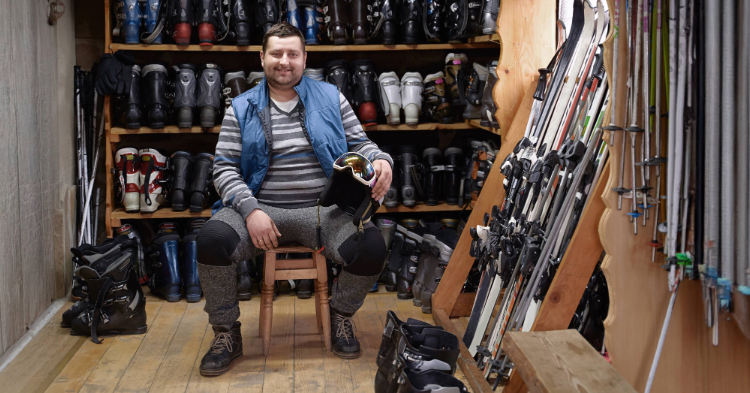What You Need To Know About Seasonal Businesses
If you’ve ever been to a beach town in July or a ski resort in January, then you’ve experienced the power of a seasonal business. These businesses capitalize on predictable changes in customer demand throughout the year. Whether it’s the influx of holiday shoppers in December or the lawn care boom in April, seasonal businesses offer unique opportunities — and challenges — for entrepreneurs.
In this guide, we’ll walk you through what seasonal businesses are, explore profitable seasonal business ideas, examine the pros and cons, and share expert tips on managing them full-time, including what to do during the off-season. Let’s dive in!
What is a seasonal business?
A seasonal business is one that experiences the bulk of its activity during specific times of the year. These businesses align their products or services with the natural rhythms of the calendar, such as holidays, weather changes or school schedules.
For example, a snow plowing service operates primarily during the winter months, while an ice cream stand might thrive in the summer. While some seasonal businesses shut down during the off-season, others pivot to alternative offerings or use that time for planning and maintenance.
Businesses that experience seasonality changes aren’t necessarily the same as businesses that experience normal business ebbs and flows — or cyclical changes. Business cycles exist over longer periods of time, in which there can be both economic growth and contraction. So while seasonality and business cycles both involve changing conditions over time, business cycles occur over a longer period of time and aren’t specific to seasonality.
What are some ideas for a seasonal business?
If you’re thinking about diving into the seasonal business world, it’s essential to pick a niche that matches your skills, interests and local demand. Below are some tried-and-true seasonal business ideas broken down by busy season.
Spring and Summer Seasonal Business Ideas
Warmer months are conducive to outdoor business opportunities and tourism-related businesses.
Lawn care and landscaping. Grass grows fast and thick in spring and summer months — creating a strong demand for mowing and landscaping businesses.
Tourism services. Think bike rental business, kayaking tours or local guide businesses in vacation hotspots.
Event planning and wedding services. Warmer weather means more outdoor weddings and events.
Ice cream stands or food trucks. These thrive in parks, farmers markets, beaches and downtown areas where there’s an established customer base.
Pool maintenance and cleaning. Homeowners need help getting their pools ready for the season and maintained throughout the warmer months.
Fall and Winter Seasonal Business Ideas
Colder months offer opportunities for holiday-based businesses and other businesses that may help ease the impact of the weather.
Holiday decorating services. From Halloween to Christmas, people are willing to pay for pro-level decorations.
Firewood sales. Selling and delivering firewood can be a surprisingly lucrative small business during the winter season.
Gift wrapping or custom gifting services. During the holiday season, people look for ways to save time and make things special for their families.
Ski or snowboard rentals and lessons. These types of local businesses are perfect if you live near a mountain or resort town.
Snow removal services. If you’re in a region that gets regular snowfall, snow plowing or sidewalk shoveling is in high demand.
What to know about starting a seasonal business.
Jumping into a new business can be scary — whether seasonal or not. Here’s what you should consider before starting.
Advantages
Lower startup costs. Many seasonal businesses require only temporary setups, reducing overhead.
Flexibility. Seasonal work can leave you with months off to travel, rest or pursue other projects.
Focused marketing. Since you’re only operating part of the year, your marketing campaigns can be sharp and targeted.
Predictable cycles. Customer demand is often consistent year over year, making it easier to forecast.
Challenges
Cash flow issues. Since revenue comes in spurts, budgeting for the off-season is crucial.
Hiring and retaining staff. Hiring seasonal employees may be hard to train and retain year after year.
Storage and inventory. You’ll need places to store equipment or unsold products during the off-season.
Weather dependency. Many seasonal businesses are at the mercy of unpredictable weather.
How to effectively manage a seasonal business.
Running a successful seasonal business means managing both the busy and slow times effectively.
Plan ahead. Start preparing for your busy season months in advance. This includes ordering supplies, hiring staff and ramping up marketing.
Track data. Use sales and customer data from previous seasons to refine your pricing and business plan.
Build a strong brand. Just because you’re only open part of the year doesn’t mean you shouldn’t invest in your business identity.
Maintain customer relationships. Use email newsletters or social media to stay top-of-mind during the off-season.
How to use your off-season effectively.
Don’t treat the off-season as “downtime.” Instead, use it strategically to build a stronger business.
Evaluate performance. Review your financials, customer feedback and marketing outcomes.
Train or upskill. Take courses or workshops to improve your business acumen or service offering.
Develop new products/services. Consider ways to extend your season or diversify your revenue streams.
Network and plan. Attend trade shows or connect with other business owners in your niche.
Business funding for seasonal businesses.
Securing funding for a business that isn’t operating year-round can be tricky, but it’s not impossible.
Lines of credit. Flexible funding options like a business line of credit help cover expenses during the off-season.
Short-term business loans. A short-term business loan might be useful for stocking up on inventory before your busy season.
Grants. Explore local and federal funding opportunities, especially if your business serves a niche market.
Microloans. Microloans are small businesses loans — typically under $50,000 are designed for businesses with limited credit access or history.
Revenue-based financing. With revenue-based financing, repayment is tied to your actual earnings, which works well with seasonal cash flow.
It’s important to build strong financial habits — like saving during peak seasons — to prepare for the leaner months.
The Bottom Line
Seasonal businesses offer a unique path for entrepreneurs who want to leverage specific times of year for profit. Whether you’re drawn to the energy of summer festivals or the charm of the winter holidays, there’s likely a seasonal niche that fits your skills and lifestyle.
The key to success lies in planning, flexibility, and using your off-season wisely. With the right approach, a seasonal business can be not only profitable but also personally rewarding.
Ready to take the plunge? Start small, stay nimble and make the most of each season.
Seasonal business owners sound off: What’s one piece of advice you’d give someone running a seasonal business?
Plan two seasons ahead so you aren’t scrambling.
“Plan two seasons ahead so you aren’t scrambling. It’s easy to get sucked in by the current wave, but real growth comes from already preparing for the next one. We construct our campaigns, finalize inventory and arrange creatives long in advance so that we can scale with ease when demand spikes.
Use the off-season to reinforce the ops. We use quieter months as an opportunity to test, iterate and improve behind the curtain. That’s when we optimize customer flows, assess feedback and consider fresh offers without the pressures of flourishing sales volume.
During one slower summer, we did things like reimagine our presentation of the gift bundles and adjusted the checkout flow. Those updates didn’t feel urgent at the time, but they paid real dividends when holiday traffic returned. In that year, our cart abandonment rate decreased by almost 20% and we were in a position to scale without stopping mid-season to fix stuff.”
Amra Beganovich
Create demand before your busy season hits.
“One of the biggest lessons I’ve learned from running a seasonal business is that you can’t afford to be reactive; you have to create demand before your busy season hits.
In the HVAC industry, where things slow down between peak heating and cooling months, we’ve built stability through proactive service programs. We don’t wait for customers to need us — we call them before they realize they do.
Whether you’re in home services, retail, or tourism, the principle is the same: build in systems that smooth out the highs and lows. For us, that looks like memberships, pre-scheduled service, and ongoing education that keeps customers engaged year-round. It also means our team stays busy and supported, which improves retention. Seasonal doesn’t have to mean inconsistent. You just have to plan like it’s always busy.”
Stephanie Postell
Keep a running to-do list for the off season.
“I run a business called The Ski Retreat, where we curate all-women ski/board trips focused on community, empowerment, and adventure. Our season runs from about December through April and that’s when I’m in what I call “full retreat mode.” I am either prepping for a retreat, on a retreat, or doing the follow up from a retreat.
Once the season kicks off, I’m in survival mode with little time to think beyond the day-to-day. That said, my best advice is to keep a running list during the busy season of what can be accomplished in the off season.
That list where I write down all of my in the moment learnings, ways in which my processes and operations can be smoother, guest feedback and all of the things I don’t have the chance to take action on in the season. The list can get long, but it helps me focus on the now while knowing that those item[s] won’t get forgotten months later. It gives me such peace of mind!”
Charlotte Lilly
This content is for educational and informational purposes only, and is not intended as financial, investment or legal advice.
Article Contributors

Amra Beganovich
Ms. Beganovich leads Amra & Elma's work on helping brands identify epicenters of influence, develop memorable (original) campaigns, and bring the brand storytelling into the future. She is one of the top New York City's influencers with over 1 million followers across her social channels. She has been named as a top digital marketing expert by Forbes, Business Insider, Financial Times, Entrepreneur, Bloomberg, WSJ, ELLE Magazine, Marie Claire, Cosmopolitan, and many more. In Amra & Elma, she develops and manages advertising campaigns for Fortune 500 companies, including Johnson & Johnson, LVMH, Procter & Gamble, Uber, Nestle, HTC, and Huawei.

Stephanie Postell
Stephanie Postell is the Co-Owner and COO of Anchor Heating & Air, a Charleston-based company she founded with her husband to raise the standard of service in the trades. Through strategic branding and mission-driven leadership, she’s helped grow one of the region’s most recognizable service brands while building a company culture that prioritizes people and purpose.

Charlotte Lilly
I’m Charlotte Lilley, founder of The Ski Retreat, a women’s adventure company designed for those who can’t sit still. The Ski Retreat began as a side passion project while I was in my career in sales and marketing at SaaS startups. I took the leap last September to full time entrepreneurship ahead of my 7th season to see where it could go. The Ski Retreat has now grown into a full-time business with retreats across the U.S., brand partnerships, and a community of women who ski/board, adventure, and take time for themselves.



